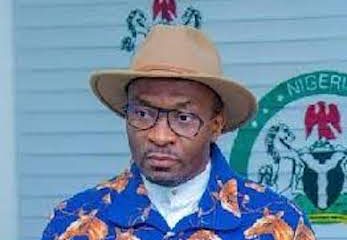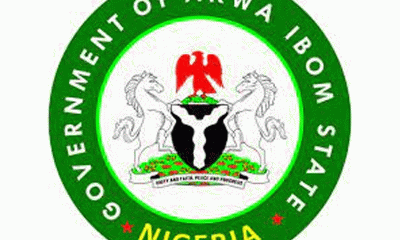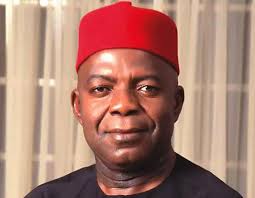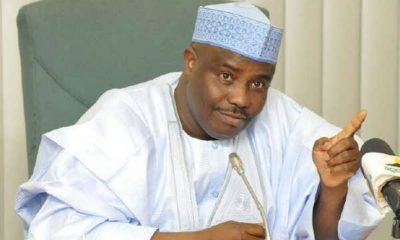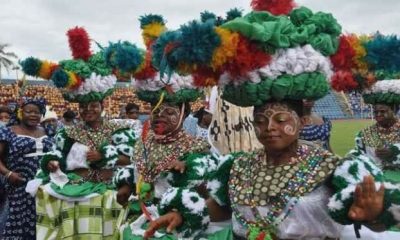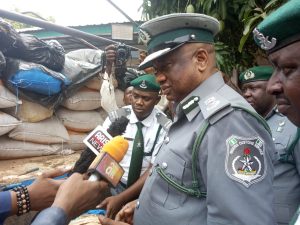Analysis
Orji Kalu: When Political Subterfuge Fails
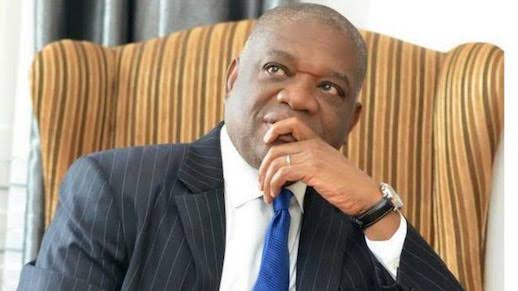
By Jude Opara
Recently, Senator Orji Uzor Kalu was sentenced to a 12 year jail term for embezzling about N7.1 billion belonging to the people of Abia State, where served as governor between 1999 and 2007.
His troubles began even when he was a sitting governor as he had running battles with former President Olusegun Obasanjo, his estranged political ally.
At that time, both the president and the governor were in the ruling Peoples Democratic Party (PDP), but somewhere along the line, the fell out. It even got to the extent that Kalu even as a sitting governor cried out that his life was in danger.
As a founding member of the PDP, Kalu who was said to have been a rich man before 1999 had also told anybody who cared to listen that he advanced about N100 million naira to Obasanjo to aid his campaign when the powers that be at that time settled for him as the next Nigerian president.
Kalu who was said to have drawn most of his power and influence from his mother, Chief (Mrs.) Eunice Kalu was seen as one of the few governors then that had the ears of President Obasanjo.
Tiger by the Tail
Some political analysts say that Kalu lost his friendship with Obasanjo shortly before the 2003 elections when most of the governors were said to have wanted to support the candidacy of Vice President Atiku Abubakar. Abubakar was the vice to Obasanjo, and it took the intervention of many eminent Nigerians and Obasanjo’s military tactic of stooping to conquer for the governors of the PDP then to agree to support him.
Interestingly, as soon as he got his second term, he decided to bare his fangs. He did not spare any of said to have almost humiliated him, including Atiku Abubakar himself.
By this time, the anti-graft agency which was set up by Obasanjo, the Economic and Financial Crimes Commission (EFCC) had fully become operationally under the leadership of Nuhu Ribadu. Many analysts said that Obasanjo established the EFCC to hound his perceived and imaginary enemies. Those who belonged to that school of thought had claimed that the corruption fight under Ribadu was selective which targeted mainly those that were no longer on the same page with the president.
So, it was not surprising that even as a sitting governor, Kalu was clearly in the radar of the EFCC. But because of his immunity then, he was never arrested by the anti-graft agency.
But his erstwhile chief of staff, who also became his successor, Chief Theodore Orji was arrested and detained in a facility in Lagos by the EFCC.
Economic Clampdown
Those who know Obsanjo very will tell you for free that the former president does not easily forgive any transgression. He is said to be legendry in hitting back at his opponents when the opportunity exists. So, the first thing he did was to slam the companies of Orji Kalu. His Slok Airline was the first casualty as its operational license was revoked. However, that was not the best decision because many Nigerians who were working there lost their jobs because the Airline relocated to The Gambia where it is still operating from till date.
Apart from the Slok Airline, it was equally reported that Kalu lost his other licences with the Nigerian National Petroleum Corporation (NNPC).
Enter the EFCC
Because he was a sitting governor who had immunity, the EFCC began by scrutinizing the people around Kalu. As I mentioned earlier, his erstwhile Chief of Staff, Theodore Orji was arrested and detained. Also Mrs. Eunice Orji and some other members of his administration were accused of corruption and money laundering.
Well this onslaught resulted to accusations and counter accusations of what necessitated the visit of the EFCC. While Kalu claimed that Obasanjo was using the EFCC to harass his mother because she refused to mobilize for his alleged third term ambition, the EFCC insisted it was simply doing its duty of fighting corruption.
However, despite the fact that many Nigerians believe that Obasanjo actually had the third term agenda, the former president himself have continued to deny ever having such intention.
The fight between Obasanjo got messy that while the federal government set up a committee which came out with a white paper indicted Kalu, the former governor equally set up his own committee in Abia State which also indicted President Obasanjo of corruption.
Till date Kalu will eagerly grab any opportunity to hit back at Obasanjo whom he can qualify with any kind of adjective he can remember.
The Survival Game
When it became obvious that the PDP was no longer conducive for Governor Kalu, he mustered his government officials and his acolytes to the Progressives Peoples Alliance (PPA). Interestingly, he also ran for the presidency under the platform of the party in 2007.
To strengthen the party he founded, Kalu worked for the emergence of his former Chief of Staff, Theodore Orji whom he sponsored to contest the 2007 governorship election under the platform of the PPA. Expectedly, with the influence of Kalu, Orji won the election even while he was in detention.
At the end of his tenure in 2007, Kalu was the guest of the EFCC who formally arrested and charged him to court. He was among others accused of using his company, Slok Nigeria Limited to embezzle Abia State government funds.
The other side of the Coin
They say it is only when somebody has power and money that his real colour will manifest. Like in most cases of relationship between godfathers and godsons, the new governor, in the early stages, they were cordial until after some time when things began to fall apart.
The EFCC was breathing down on Kalu and some observers say it was part of the reason his successor also ditched him along the line and jumped ship from the PPA to the All Progressives Grand Alliance (APGA). However, shortly after, he made a return to his former parry, the PDP.
Kalu was in political limbo at a time and the only thing that kept him going was his businesses he was managing all over the world. But since it is not always easy for politicians to remain out of relevance for a long time, he made another return to the PDP, even as he kept oiling the machinery of the PPA.
Haven failed in his quest to become a senator on the platform of the PPA in 2011, in the build up to the 2015 elections, the former governor returned to the PDP where he contested to represent the Abia North zone. Again, he failed in that quest.
However, while he failed in his senatorial ambition, the APC won the presidential election.
The movement to APC
As if to follow in the footstep of former Kano State governor, Abubakar Rimi who said it is always hot being in the opposition, Kalu started his maneuver to return to the now ruling APC. As an experienced politician, Kalu first tested the waters by encouraging his brother, Mascot Kalu to defect first. Shortly after, he too crossed over to the APC. He also claimed that his going to the APC was as a result of ‘pressure from his constituents’.
However, despite his claims, many analysts were of the opinion that it was part of his survival in the wake of his lingering corruption case in court.
May be to prove him right, the Chairman of the APC, Adams Oshiomhole publicly told a bewildered nation that if you cross over to the APC, all your sins will be forgiven.
And obviously Kalu enjoyed some respite as the body language of the government suggested that they were toning down on the Kalu case especially since he joined the APC.
Introduction of Subterfuge
In the 2019 campaign Orji Kalu vigorously campaigned for the re-election of President Muhammadu Buhari. He equally won his election to the Senate on the platform of the APC. He was also elected as the Chief Whip of the Senate.
But what has surprised many right-thinking Nigerians is the fact that in recent time, Kalu has resorted to even outright insult and debasement of his Igbo tribe. He finds it very convenient to blame the Igbo for virtually every problem.
For instance, while addressing the media shortly after he emerged the Senate Chief Whip, Kalu was quoted to have said that he had for long longed to return to the ruling party. He said he was done with the ‘Igbo thing’, that Ohaneze and those who want to fight the Igbo cause will continue without him, that he had lost so much fighting for the Igbo race. He ingloriously boasted to have brought the controversial Ruga policy to Abia State when he was a governor and even said he will vote in support of the policy any day it come to that on the floor of the senate. He was talking like the insolvent boy who had abandoned his mother for the strangers in the market. Kalu by his comments was merely saying that despite the fact that his people have openly said that they are not interested with the Ruga policy, that he will force it down their throat as long as his new masters who are the proponents of that policy are happy with him.
But he has forgotten that as we speak, the average Igbo child must score more than every other of his or her peers to secure admission into the university. Just before his conviction, the government appointed 50 Commissioners of Police and while the North West got 12 slots with Katsina getting four, the entire South East only managed to get one.
So many analysts believe that it is safe for Kalu and his likes to use the Igbo as a guinea fowl in their quest to remain relevant to the powers that be. It is on record that Kalu in recent times have courted some influential persons in the North and to prove his new developed loyalty and of course acceptance, in August 2018 the Emir of Daura, Umar Faruq rewarded him with the traditional title of Danbaiwan-Hausa.
Subservience does not always pay
The trick of insulting his tribesmen and blaming them for virtually every ill of the Nigerian society only lasted for a short while. Many analysts say the case that eventually got Kalu convicted was deliberately delayed in other to allow the former governor time to do some alleged assignments.
The trial was characterized by several adjournments occasioned by frivolous applications and unnecessary delays.
There is the allegation that Kalu was given the task of helping to tone down the activities of the Indigenous People of Igbo (IPOB). But when he failed and the leader of the group, Nnamdi Kanu travelled out of the country, those who used the case as bait allowed him to face the music.
But the whole drama came to an end when the trial judge, Mohammed Idris, convicted Orji Uzor Kalu of embezzling about N7.6 billion naira belonging to Abia State and subsequently sentenced him to a 12 years jail term.
Curiously, his new found masters whom he would eulogise to high heaves could not save him because no matter how you look at it, the love of the owner of the chicken is to eat it.
Analysis
One-party State Refrain: Litmus Test for Opposition in Nigeria

By Eddy Ochigbo
Between 1999 and 2015, the then ruling party – People’s Democratic Party (PDP) in the euphoria of victory, had boasted of ruling Nigeria for more than 60 years. The leaders of PDP were particularly buoyed by the favorable results of the 2003 general elections when it almost obliterated the Alliance for Democracy (AD) in the South-west, with the exception of Lagos state.
President Bola Tinubu then the Governor of Lagos state stood his ground and defended PDP’s raging fire of turning Nigeria into a one-party state.About two decades down the line fate has now placed Tinubu on the saddle and the same refrain of one party-state has resurfaced.
Little wonder then that the political permutations presently is that if Tinubu as an individual could wheather the storm as governor and worm his way into Aso Rock, why would it be difficult for the current coalition of political heavy weights to repeat the same feat of capturing power from the All Progressives Congress (APC) in 2027.That is a story for another day which takes us to President Tinubu’s recent tacit endorsement of a one-party state in the country. But he denied it, following widespread outcry by Nigerians against the proposal. And this serves a pointer to Nigeria’s ever-changing political climate.
Despite the president’s denial, the one-party state kite flown, described by many as an ill wind, has continued to dominate public discourse across the country. A cross-section of citizens who rejected the idea of making Nigeria a one-party state, said it would amount to monumental corruption in the polity. However, given the unprecedented number of politicians decamping from opposition parties to the APC, Nigeria may be in for a de facto one-party state, where opposition could become totally nonexistent, should the opposition surrender to APC.
Consequently, as clouds of uncertainty hang over the nation’s political scene, 2027 would indeed be a watershed as political gladiators are currently sharpening their arsenals to do what they know how to do best – capturing power by all means, while members of the electorate watch with suspicion. The political horizon is pregnant and no one knows what it would give birth to in 2027.
Why were people alarmed when the president hinted at a one-party state? A one-party state is a governance structure in which only a single political party takes full control of government and governance. In a one-party state, all opposition parties are either outlawed or enjoy limited recognition and controlled participation in the electoral process.
Even in a de facto one-party state, sometimes used to describe a dominant-party system – as is being canvassed by the president, APC is increasingly becoming a strong force that it could easily prevent the opposition from winning power, if care is not taken. Such an arrangement or platform undermines the norms and ethos of democracy.
Is Nigeria ready for a one-party state? A party state can do and undo without recourse to the electorate. Nigeria cannot afford a skewed system where there are no checks and balances. In a system where the bridge between the rich and the poor has already been widened beyond imagination, it would be suicidal for autocracy and dictatorship take the centre stage. For emphasis sake, a one-party state prohibits opposition parties and seldom allows a few independent candidates to stand for election to compete with party candidates who enjoy the full support of the party machinery. In the end, it is winner takes all with the party placing party members and sympathetic candidates in key political positions without caring about the needs of members of the electorate to whom power should belong.
For instance, the Chinese and Cuban Communist parties which derive their authority from the ‘communist manifesto’ – popularized by renowned philosophers – Karl Marx and Friedrich, contrary to participatory democracy. But then such system is sympathetic to the dictatorship of the proletariat. But how do one explain the dictatorship of the previleged few in a participatory democracy? That is exactly the snag with a one-party system in capitalist country like Nigeria.
The communists are of the view that the opposition is needed only in capitalist countries because of the existence of diverse interests there. In order to represent those diverse interests, different parties are formed and organized. But in the countries where capitalism has been abolished, and where only the labour class exists, there is no need for different parties and only the communist party is sufficient to look after the interests of the workers. But Nigeria is not a communist country; it is a capitalist economy of which Tinubu remains a great beneficiary.
A one-party state recognizes the trade-off between election victory and gathering valuable data. To account for this, such a state places local nobility in easy-to-win races as encapsulated by its principles or ideological bent. One-party states bend the rules of democracy and insist that only the most popular members of the party are given the mandate as may be reviewed by the party leadership from time to time.
They also gather data from elections to indicate if a local official is performing poorly in the eyes of residents. This gives locals the opportunity to monitor local officials and communicate their satisfaction to the government. Throughout the country, members of the one party hold key political positions.
In doing so, the party avoids committing outright fraud and rather sustains their power at the national, sub national and local levels with strategic appointments of members going to loyal party members. The one-sided nature of one-party regimes makes it difficult for a level playing field due to lack of transparency and fairness.
Ironically, President Tinubu, who sees nothing wrong with a one-party system, represents a perfect example of a politician who in the not too distant past resisted the idea of a one-party state. As earlier stated, President Obasanjo’s Peoples Democratic Party (PDP) won nearly all of the South-west from his Alliance for Democracy (AD) in 2003, Tinubu, then the only surviving opposition governor in the region, refused to give in.
It took him two decades of struggle to rebuild and work his way to the pinnacle of power. And now that the president seems to be angling for a one-party state, he must be reminded of his stance in the past. He must be reminded that a one-party system often leads to dictatorships which discourages democratic representation, concentrates power in the hands of money bags and makes corruption more likely. A one-party state does not represent the diversity of public aspirations and while it may provide some form stability, it tends to be undemocratic and lack oversight of government actions.
At the APC Renewed Hope Agenda Summit held at the State House recently, Tinubu, while reacting to the gale of defections from other parties into the APC, asked his fellow members of the party to “wipe them clean.” APC, he insisted was “one party ruling and carrying on with the aspirations of Nigerians. You don’t expect people to remain in a sinking ship without a life jacket. I am happy with what we have accomplished and expecting more people to come; that’s the game.”
Perhaps the accomplishments Tinubu is referring to, is the destruction of Nigeria’s middle class which has sent more than 70% of the citizens into multi-dimensional poverty. Perhaps the accomplishments the president is talking about is the astronomical jump in the price of petroleum products which has caused prices of food stuffs, transport fares, electricity, healthcare and what have you, to hit the roof, to the chagrin of Nigeria’s urban and rural poor. Perhaps, the accomplishments the president is alluding to is the deep devaluation of the naira which has rendered the naira a slave to other currencies.
Again, could the worsening insecurity ravaging the country be part of the president’s accomplishments? One can go on and on to reveal the worst economic crisis in decades in Nigeria, making citizens to sacrifice almost everything just to survive. Yet, the president is glaringly insisting that his ‘bold economic reforms are necessary because they will be fruitful in the future.” Which future? What future?
During the state house event, in what appeared to be an account of his two years in office, the president reflected on what he called his government’s economic reforms. “Nothing good comes easy”, he said, justifying the people’s suffering under his government. He maintained that, “sometimes, only hard decisions can make things easy in the future.” Leading an administration which, while campaigning for Nigerians’ votes in 2023, carried the heftiest baggage of anticipated elasticity of corruption, Tinubu’s testimony of fighting corruption is neither here nor there, “You could see EFCC recover over seven hundred and fifty-something houses from one person”, he volunteered, claiming that life had become better and the future assured for the people of Nigeria. How assured is the future of Nigeria and Nigerians when starvation has become the order of the day. One is not a prophet of doom but that is the stark reality facing helpless Nigerians.
Sensing the threat posed by the ruling party to turn Nigeria into a one-party state, a coalition of leading politicians opposed to the Tinubu-led administration has formally applied to the Independent National Electoral Commission (INEC) to register a new political party – the All Democratic Alliance (ADA). The application, dated June 19, 2025, was received by INEC on June 20, 2025, with “Justice for All” as its slogan.
The coalition is in pursuit of a new party due to what it described as the infiltration of existing political parties by government-backed elements. Recall that Nigeria National Coalition Group (NNCG), led by former Senate President, David Mark along with prominent political figures like Rotimi Amaechi, have been working assiduously towards forming a new party to challenge President Tinubu in 2027 general elections. The proposed party, has Chief Akin A. Rickets and Alhaji Musa Elayo as Protem Chairman and Protem National Secretary, respectively. The coalition’s decision to register a new party is coming amidst increasing dissatisfaction with the Tinubu administration.
Whereas governance is rapidly taking a much wider meaning and no longer restricted to rule or administration, Nigerian politicians place little or no premium on what constitutes governance, let alone good governance. Since political power is ultimately exercised in the manner that politicians desire, certain principles must be followed, in order to gauge certain standards and norms. Such judgment should be based on several criteria viz: participation of citizens, upholding the rule of law, transparency of the system, responsiveness of the authority, consensus oriented policy, equity and inclusiveness, accountability and strategic vision of the authority, as the case may be.
It is very sad that after 26 years of democratic rule, participatory democracy is still in doldrums, manipulated by self-seeking politicians.
Whose interest would a one-party system serve? What is the essence of democratic governance? Is it not government of the people by the people for the people? Out of desperate quest for power, vested interests in the power game are ready to compromise any institution to realize their inordinate ambition of capturing and remaining in power. Nigeria’s uninterrupted democracy for almost three decades should be jealously guarded and regarded as an elixir to strengthen and promote democratic ideals. This is fulcrum of democracy. The game should be about a level playing field for all.
Nigeria’s uninterrupted democratic journey must not be taken for granted; it should engender growth and survival of globally accepted ideals of freedom of speech, freedom of assembly, voter enfranchisement and political participation. There must be room for old and new breed politicians. The political space must not be dominated by only the rich and mighty who want to remain in the political turf permanently.
Even though in politics we are told that there are no permanent friends but permanent interests, such interests should be geared towards the collective aspirations and full participation of the citizenry in the electoral process; to avoid a situation where politicians get richer and richer by the day while the masses continue to wallow in abject poverty and want.
So any move to render opposition powerless is not in the interest of the people because the opposition has a very significant role to play in the governance and government. Any well-meaning authentic government that means well for the people must recognize the concerns of the opposition, otherwise the essence of democracy would be totally defeated. By and large, Nigerians must embrace the on-going campaign to make politics at every level less attractive. It should be about service, not primitive accumulation of wealth.

Analysis
The APC Beyond Buhari, By Chidi Amuta
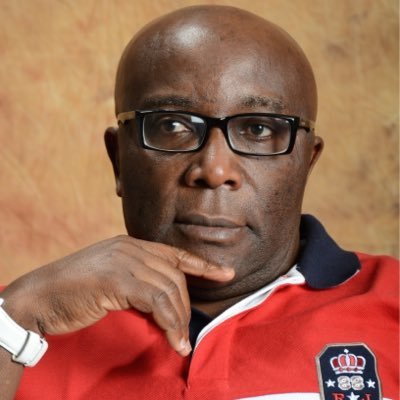
The APC was birthed out of Mr. Buhari’s resilient appetite for presidential power. Its victory in the 2015 presidential election satisfied that hunger and lavishly fed it for eight years. His victory then was a product of both his northern regional cultic followership and a nationwide rejection of Mr.
Jonathan’s bumbling presidency. Eight years afterwards, Buhari’s appetite for apex power has been fulfilled, richly rewarded and arguably squandered in terms of a credible legacy. His pet nativist hegemony project came full cycle and even overreached itself. With a largely expired national relevance, Buhari has since gathered his belongings and returned to the pastoral anonymity of his native Daura.Looking back, the coalition of parties that gave birth to the APC was an inconvenient marriage of political convenience. There was nothing in common among them. There was a pseudo social democratic CAN. There was an ultra conservative CPC literally owned by Buhari himself. There was also a nationalist right wing ANPP, and an ethno nationalist APGA. To complete the picture was a renegade and opportunistic centrist NPDP made up of a faction of governors who broke off from Jonathan’s PDP .
The cardinal objective was to cobble together a workable electoral coalition to wrest power from the PDP after 16 monotonous years. The idea of a multiparty coalition eventually gave way to the even better idea of a single opposition party. A unified party was required to win an election if the hegemony of the PDP was to be toppled. The nation was hungry for a change from the PDP whatever the name of a viable and credible opposition.

Mr. Buhari facilitated and galvanized the marriage. He provided the amalgamation with a presidential mascot albeit one with a national name recognition and leadership mythology. He also came dressed in an untested mythic garb of leadership prowess, governance prudence, barrack discipline and a reasonable level of personal integrity and austerity. Above all, he had managed over the years to build up a huge cultic following among the northern mob of rough uneducated and unemployed youth and regional power fanatics. Part of the motor park fable around Mr. Buhari was the infantile notion that once elected president, he would jail all the corrupt former government officials, recover the ill- gotten wealth and redistribute same among the poor masses. His political salesmen required no better set of unique selling points.
Thus was born the APC, a party tailored more towards wresting power from an effete incumbent than for the effective governance of a country in desperate need for responsible leadership. Given the tenacity of African power incumbents, the APC was more honed for the task of contesting the outcome of the 2015 presidential election possibly up to the Supreme Court. It spared little time rehearsing a governance nad leadership model for the nation. “Anything but Jonathan” was the slogan in town!
But when the results tumbled in mostly in favour of the APC and Mr. Jonathan conceded defeat to Mr. Buhari, it was an overrated and unprepared APC that had to set up a government and ascend the pinnacle of national power. Victory came as a rude surprise with power as an unanticipated burden. Time has passed. Buhari has fulfilled his long standing ambition of wearing the toga of President and gone home after completing two terms of eight wasted years . It is now time for the party to take stock of its stewardship and contemplate its future as a ruling party.

With the benefit of hindsight, the emergence of the APC reinforced Nigeria’s historic tendency towards a credible two party architecture as previously recognized by the military administration of General Ibrahim Babangida. To that extent, the emergence and electoral victory of the APC as and when they occurred was a positive political outcome, one which promised a great dividend for Nigeria’s democracy and future political party architecture. The new party came to power on the wave of expectations greater than its capacity and preparedness. Even then, having successfully hounded the PDP out of power at the national level, the APC had two tasks. First, it had to develop into a party with a national membership spread, credible internal democratic structure and a definable ideology to anchor its policies on. It had a mandate to rule and to govern more creditably than the party it ousted. But beyond its logo and Buhari as electoral mascot, there was nothing substantial about the APC.
Regrettably, however, the APC has not grown beyond the logic of its incoherent origins. It has turned out to be just merely a ballot paper alternative to the PDP. After close to a decade in existence, it has no ideological identity, no policy coherence, no record of sensible governance at the federal level and state levels. Admittedly, an isolated number of APC ruled states (Kaduna and Lagos especially) have managed to show signs of some progressive policy direction and arguably a bit of good governance. But the party has hardly tried to galvanize an effective grassroots membership to consolidate over eight years of power dominance at the center.
From the very top, the APC remains an embarrassing ideological proposition and oddity. I doubt that from Mr. Tinubu to the most mundane foot soldiers out there, that word ideology ever comes up even in casual conversations. I doubt that most of the party faithful have ever bothered about the meaning of the word “ideology”! But as a political organization, we need to dress up the APC and its leading lights in some ideological garb in order to make sense of their quarrels or at least give the party a reason to exist. As my friend George F. Will would insist, “We can dignify …disputes among small persons of little learning by connecting them with great debates about fundamental things.”
Let us therefore confront the ideological curiosity of the APC. Here is a so- called ‘progressive’ party led by an unabashed arch- conservative in the person of former president Buhari and now a bucaneer social democrat in the person of Mr. Bola Tinubu. This is one of the greatest ironies of recent political theory and history. Ordinarily, progressivism indicates a bias for social democracy in its dynamic context. It should signal a commitment to continuous social and economic democracy and change along progressive lines. Progressivism is decidedly partisan on the side of the masses while acknowledging the entrepreneurial class as an engine of growth and wealth creation. Instead, Nigeria’s “progressives” are a loose collection of free wheeling brief case capitalists, commission agents, primitive accumulators and racketeers in every imaginable merchandize.
The party previously led by the diehard conservative Buhari is now under the wings of Bola Tinubu. He may be sympathetic towards the plight of the masses in whose name he is mouthing incoherent policies while they bear the early brunt of his IMF-style policies. Buahri was a confused advocate of Medieval economic fundamentalism of controls and over regulation of nearly everything from domiciliation of government bank accounts to the distribution of fertilizers to peasants.
In spite of its abysmal performance in government for over eight years, the APC predictably “captured” power in the still contentious February 2023 presidential elections. Mr. Bola Tinubu, Buhari’s effective political ‘God Father’ is now incumbent president. He has accordingly, moved to rejig the leadership of the party to serve his own power ends. He has quickly hand picked a new party Chairman in the person of the former dollar-hugging Kano governor, Mr. Ganduje . He has also ousted Mr. Omisore as party Secretary.
A preliminary view of the political calculus of the party going forward indicates an entrenchment of interest in the basic regional and sectarian equations that handed power to Mr. Tinubu. The initial changes in the leadership architecture of the party indicate a reinforcement of the South-West, North East and North Western power base of the party. There also seems to be an incremental confidence in the effectiveness of a predominantly Muslim orientation of the party leadership. This much can be gleaned from the initial skirmishes around the party headquarters .
In spite of its victory and electoral majority in the number of governorships and a clear parliamentary majority after the 2023 elections, however, Mr. Tinubu now recognizes that he cannot take the pre eminence of the APC for granted. He needs to strengthen the party in order to govern and also maintain a basic continuity of political authority. He cannot easily forget so easily that the pre-eminence of the party in the present political spectacle remains tenuous. The party was substantially challenged at the February 2023 election as may become more evident when the tribunal and court challenges of the outcome are concluded. A 36% voter score of less than 8 million votes out of less than 20 million total votes cast at the presidential election out of a registered voter population of 80 million plus cannot give a ruling party comfort.
In addition, between the two opposition parties – the PDP and the Labour Party- there is enough groundswell of popular support especially Mr. Peter Obi’s Obidients to keep the APC awake for the foreseeable future. As things stand, the APC still has an existential challenge: how does it survive in and of itself as a political party? How will it persist as a ruling party in and of itself given its regional incoherence? Above all, how will it survive as a strategic national institution of democratic stability if its existence is dogged by far reaching but latent regional and sectarian under currents?
Even now on the eve of Mr. Tinubu’s first 100 days in office, there is a palpable fear that the future of the party is headed into turbulent clouds. A few prominent party faithful have resigned in protest to the recent leadership changes. Of course, the party could somehow tinker its way through this initial immediate post election patronage and pork barrel stretch of the new administration. Mr. Tinubu can expect to enjoy some party solidarity and superficial unity in these honeymoon days of anticipation of patronage and appointments by party people.
Beyond the appointment of ministers, there are still numerous boards of federal parastatals, ambassadorial positions and sundry sweetheart contracts to be dispensed. But when that is over, it will be clear that the majority of party members will have been left out in the cold. They may go shopping for other party umbrellas well ahead of the next election season.
In spite of the present appearance of camaraderie, the APC cannot hide its many headaches and underlying troubles. But in whichever direction we look, the party is threatened by internal contradictions and gaping cracks that lie deep in its very found The APC was born out of a private political ambition. It prevailed for 8 years only because it won the presidential election in 2015 against a leaderless former ruling party. Having repeated that feat in 2023 in spite of its dismal performance in government under Mr. Buhari, it is only likely to survive in power if it can transform itself from an African “Big Man” party to a broad based grassroots party. Otherwise, the future political landscape of Nigeria belongs squarely to youth based populist movements like Peter Obi’s Labour Party and its Obidients or others in that mould. The real terminal danger for the APC is in the future fights among its many ambitious contenders for Mr. Tinubu’s throne if he falters. The even greater danger to the hegemony of the APC lies in the massive discontent of the youth followership of its opponent parties.
Analysis
The Deceptive Tactics of IPOB
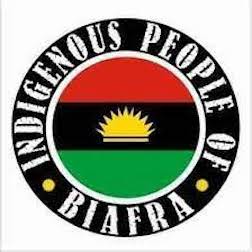
By Emeka Jerome
All warfare is based on deception. Hence, when able to attack, we must seem unable; when using our forces, we must seem inactive; when we are near, we must make the enemy believe we are far away; when far away, we must make him believe we are near –Sun Tzu
In the words of the revered war strategist Sun Tzu, deception is a critical component of war execution.
Echoing Sun Tzu’s teachings, the proscribed Indigenous People of Biafra (IPOB) has refined the craft of deception, using a tapestry of falsehoods to advance and achieve their objectives. This treatise will highlight how the group has continually employed deception as a weapon of war to deceive gullible members, keep the public attracted to them and deepen its presence in the south east. No doubt, IPOB’s ascent to prominence was founded upon a bedrock of deception right from its inception. Spearheaded by Nnamdi Kanu, the emergence of IPOB was an outgrowth of the supposedly reformed Movement for the Actualization of the Sovereign State of Biafra (MASSOB), a pro-secessionist group that had already seen its power wane and was known for its cunning activities and propensity for violence. Although IPOB came into being in 2012, Kanu had already garnered a significant following due to his inflammatory broadcasts on Radio Biafra, a responsibility he had taken on as a member of MASSOB. Recognising that the decline of MASSOB could spell the end of his influence, Kanu, aiming to secure both relevance and financial gain, intensified his facade of advocating for Biafra’s freedom.He accomplished this by spreading propaganda against the Nigerian Government and fostering optimism among the susceptible members of the public. By rebranding and emerging as a new entity, IPOB projected an image of a fresh movement seeking self-determination while carefully avoiding associations with MASSOB’s past activities. His strategy worked because in no time, Kanu assumed command over the sphere of IPOB’s operations, rapidly ascending to its helm.
When IPOB started its brand of agitation, it was cheered on. Nnamdi Kanu became an overnight messiah. The poor vulnerable uneducated market apprentices became his ardent followers. He exploited them. Kanu adequately deployed his expertise of Radio Biafra to deceive. By broadcasting incendiary messages and misinformation, he manipulated emotions and perceptions of the public to IPOB’s advantage.
The false narratives he propagated about the Nigerian Government’s actions and intentions fuelled anger and frustration among his followers. The use of hate speech and derogatory language against Government, portraying them as oppressors and enemies of the people painted a one-sided narrative of victimhood which generated sympathy for their cause, making it difficult for their followers to critically assess the situation. By leveraging international media attention, IPOB amplified their narrative on a global scale. Sensationalized headlines and stories about their activities played into their strategy, allowing them to maintain the façade of a legitimate movement fighting for self-determination while downplaying or omitting their more radical actions.
The group while orchestrating actions that provoked responses from the Nigerian Government, created martyrs and gained international sympathy. Most of their tactics aimed to paint IPOB as a peaceful movement unjustly oppressed by a hostile government, thus diverting attention from their own aggressive activities. Ironical!
Unsurprisingly, Igbo diaspora across Europe and America began to join IPOB. Politicians back home were consulting its leader, Kanu. His house became a Mecca of sorts. Kanu got emboldened and then, combative. He became proud and dictatorial. His words were feared. He aspired by every means to be like Ojukwu, famed for his lionic roars.
Kanu had disciples. Within this newfound position, Kanu artfully manipulated the collective sentiment, leveraging deception to foment hostility towards the government under the guise of championing the elusive cause of Biafran freedom. His financial resources began to significantly swell in different hard currencies. He skillfully garnered financial support from both the rich and the poor under the ploy of rallying donations to fuel the secessionist agenda. Simultaneously, as his personal coffers grew richer, he persistently peddled false hope to his followers, deceitfully and heartlessly portraying himself as their champion in the struggle. Kanu became bolder and went ahead to establish a military Wing, the Eastern Security Network (ESN).
Operating ostensibly to counter Fulani herdsmen in the South East or so we were told, the ESN initiated a series of assaults designed to stoke the flames of ethnic conflict and destabilise the nation. Paradoxically, the reported activities of Fulani herdsmen have notably diminished, however IPOB’s actions in the region has remained persistent.
In what initially appeared to be a child’s play in the beginning, soon transformed the South East into a breeding ground for violence, marked by a surge in assassinations, bloodshed, intimidation and various forms of mayhem. Security agencies sent to the zone to restore order became targets for annihilation. The group’s orchestrations have, indeed, in the spirit of Sun Tzu’s teachings, harnessed deception’s formidable power to its advantage. Recognising that Kanu, a Nigerian based in London and his group held the potential to plunge the country into anarchy if left unchecked, the Nigerian government took proactive steps. It proscribed the group and went a step further by extraditing Kanu back to Nigeria.
This was to ensure he faced charges for the chaos and destabilization he allegedly caused in the Southeastern region. In response, the group members protested and began issuing out senseless sit-at-home orders every Monday. Doom awaited whoever dared to come out on days meant for the so called sit-at home. Even school children were not spared.
The young and old met same fate. For each day sit at home order was enforced, millions of naira was lost. Trading, economic, educational activities were halted. The sick does not dare to go to the hospital. Regardless of the protests voiced by the local inhabitants, IPOB ruthlessly dealt with anyone who dared to defy their directives, ironically targeting the very individuals they professed to champion and liberate. Deception at the highest core! For the people, the snake they nurtured in their bosom has now turned around to bite them.
With Kanu now in custody and facing legal proceedings, his disciple Simon Ekpa, in faraway Finland, capitalized on his mentor’s influence to achieve his own rise to prominence. Recognising the opportune moment for him to also cash out, Ekpa launched a deadlier faction called the Autopilot and afterwards the Biafra Government in Exile. He continues to give false sense of hope to liberate Biafrans while using them to swim in millions. Same as his mentor, it has now become unmistakably clear that IPOB’s motivations are primarily driven by financial gain. Under the pretext of calling for the release of Kanu, he dishes out orders to for sit-at-home, organises fundraising frequently with the false and deceptive narrative of using the money to fund ESN.
How laughable. Ekpa became more vicious. The South East is currently in a mess. Sit-at-home orders stretches for weeks with zero considerations of how it negatively affects the poor residents. Meanwhile the person issuing out the directive is doing so from the comfort of his home abroad.
IPOB’s skillful use of deception as a strategic weapon of war becomes even more apparent when considering recent developments. They are now attempting to distance themselves from the autopilot faction of IPOB led by Simon Ekpa. IPOB is doing double speak. At one instance, it wants to distance itself from Sit-at home. At the other, it states that though it started it, Simon Ekpa is not implementing it its own way. But at least, it was Kanu and IPOB that started it. They are in agreement.
While they vehemently deny that the Eastern Security Network (ESN) engages in combative and violent activities, this assertion contradicts the evidence provided by the numerous arrests made and the ongoing campaigns carried out by the military and other security agencies. As the number of arrests increases, IPOB intensifies its efforts to disassociate itself from these individuals, seemingly attempting to detach their image from these actions.
Yet, in ironic twist, they continue to advocate for the release of these very individuals they claim not to be affiliated with. The contradictory stance of denying membership while concurrently issuing press releases about the detention of their members raises questions about the veracity of their claims. It is as if they are performing a delicate balancing act, trying to maintain an image of innocence while supporting those apprehended.
Furthermore, Simon Ekpa’s frequent calls for a sit-at-home protest have created a conundrum for the group. In light of the public’s skepticism and widespread condemnation, they appear to be shifting blame onto Ekpa’s faction, using this as an opportunity to once again deceive the public into believing that they are the virtuous side. But it is evident as daylight that in a larger context, IPOB’s insistence on non-violence stands in stark contrast to past actions. During the EndSARS protests, Nnamdi Kanu’s directive to his followers to burn down Lagos demonstrated their potential for incitement. T
he ensuing chaos and destruction following this directive were widely observed. Their claims of nonviolence also clash with their association with the Ambazonian secessionist group in Cameroon, an entity known for its aggressive tactics.
The inconsistency is further highlighted by their clashes with the Army and Police in the South East. These confrontations raise questions about their true intentions and undermine their assertions of nonviolence.
In the face of these complex and often contradictory actions, IPOB’s manipulation of information and narratives emerges as a deliberate and sophisticated strategy to shape public perception, rally support and maintain a facade of innocence even as evidence points to a different reality.
Another strategy being deployed by IPOB is the sustained misleading narrative that all rival factions other than its own are sponsored by the Federal Government or its agencies. This claim is distorted and contradicts the evident struggle for supremacy between Kanu and Ekpa. It is important to note that Kanu broke away from MASSOB. Ekpa is only traversing a similar path. Why then is Kanu angry and propagating falsehood for the purpose of deception? At the moment, the times are not good for the IPOB. It is in dire straits and fight of its life. It is in a big struggle as its days are numbered. Sooner than later, like its predecessor Biafra-Republic-agitation-associations, will become extinct and go into oblivion. This is not a false prophesy. It is a matter of time.
Again, like the South East elite and governments, IPOB has got a wild cat for a pet and it turned to feed on it. All is not well with Kanu and IPOB. They have both crumbled and crawling. There is fire on the mountain and IPOB is in disarray. It is struggling. Kanu is in detention. His IPOB is in shatters. Disorganised.
Only vultures have surrounded him. Everything is wrong. There is leadership tussle. IPOB has broken into factions. There is Simon Ekpa autopilot. There is Chika Edozien Directorate of State (DOS). IPOB is in a big fight over its finances. Kanu’ s younger brothers want to control it. In Germany, Italy, London, France among others IPOB huge funds is at the heart of a fight. Some accounts have been blocked. Others are objects of litigation. Kanu is worried. He is losing control. There is a bigger fight among Kanu’s legal team.
No cohesion. Some feel entitled. There’s contest over who is the lead counsel. Some lawyers who never had addresses or any profitable ventures have found rest in IPOB. Some who couldn’t have won the simplest civil cases in a customary court are cashing out on IPOB and fleecing Kanu. Poor him.
While IPOB burns, Southeast also burns. Eastern Security Network, unknown gunmen, kidnappers, hostage takers, warlords, combatants, killers, marauders, blood suckers, violent vigilantes have taken over the region. Only a reign of terror is visible. IPOB is helpless. Simon Ekpa, from far away Finland is fueling the crisis. Violently forced sit-at-home order is enforced by those IPOB struggles to deny are not its members.
In the absence of Kanu, Ekpa has tried to mimic him in voice, attitude and carriage. The kill-them-order, has accentuated. Ekpa tries to outdo Kanu. Ironically, Kanu is in denial. He and IPOB are desperately denying that Ekpa isn’t their member or working for them.
A time was when Kanu publicly called for attacks on Nigerian Soldiers and other law enforcement agents including the police. Kanu called for violent attack of fulani herdsmen. He called many Igbo politicians names. He called them Efulefu. What has Ekpa done differently? IPOB is just intelligent by half. Now, the organisation and Kanu want Monday sit-at-home cancelled but used for Economic Empowerment Day (EED) and call/march for his unconditional release. Any difference? Whether as sit-at-home or EED or call for Kanu’s release, is it not the same? Double speak!
The new plan is even more dangerous. It will bring Kanu’s faction of IPOB into confrontation with Ekpa’s. Then blood will flow. A bird that leaves the ground and perches on the anthill is still on the ground. This is an Igbo adage. Kanu claims IPOB is not responsible for the dastardly acts in the South East. But he has not denied tasking ESN to be bloody. Even now, he tries to deploy the ESN for certain accomplishments. Initially, we were told ESN was fighting Fulani herdsmen. But is that still true? We were told it was about Buhari. Is he still there?
There is another angle we are ignoring. Kanu has never denied not to have committed most of the things he is accused of. His very dull infantile defence is that he did that in the UK, a jurisdiction not covered by Nigeria. Fact is that Kanu and his cohorts have injured the South East, Ndigbo and humanity. History will not judge him right.
He may pontificate and grandstand. He may look for scapegoats and point accusing fingers to “innocent” persons and places. He has destroyed his homeland. He has destroyed Igbo culture, value and ethical discipline. Igboland is in ruins, the type never suffered during the civil war. While IPOB thinks or believes that its tactics are superb and impregnable, they are rather self-destructive. The tactics have not only impeded peace in the South East but inhibited the resolution of the crisis and perhaps, encouraged the continued incarceration of Kanu.
At the end, Ndigbo will understand the essence of the current agitation. They will understand that it is a complete ruse. It is a manipulative deception; a heist organised by some negatively ambitious young men who, in their desire to be rich, started a variant of 419/Yahoo Yahoo. It worked for them. They got the money and attention of the vulnerable. They used intimidation, harassment and fear mongering to actualise their aim.
The bone of contention among IPOB leaders is about how to keep and share the booty. The one behind the bars wants to maintain a control from detention. The money is so huge to be left in the hands of others. Kanu is voracious for money. IPOB is rich and the funds cannot just be left like that. The agitation is no longer about Biafra or Ndigbo. It is about Money, Women and Power. It is an ego fight among select narcissists.
The IPOB leaders do not want the Igbo followers to know this. It will not be good for their narrative and end goal. It will deflate the deceptive tactics. Keeping the propaganda and fake news alive is the best they can do. The deceptions work, at least, for now. But the lies will definitely die someday. There is a short span of life for lies and deceit. Sooner than later, light and knowledge will come upon Ndigbo. May that day come. And quickly too.
Emeka Jerome, writes in from Umuahia, Abia State.

